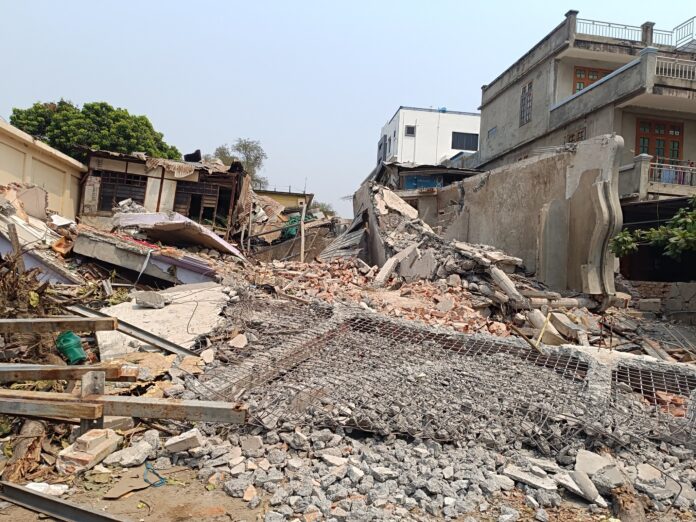Relief efforts in areas of Mandalay and Sagaing Regions, which were severely impacted by the recent earthquake, have shifted from search and rescue to reconstruction, according to humanitarian groups working on the ground.
Following the 7.7-magnitude earthquake that struck on March 28, over 3,600 people have been confirmed dead, with hundreds more still missing, based on available data.
Search operations for missing persons have largely concluded after domestic and international rescue teams used advanced technology to scan for survivors, but found no signs of life. As a result, efforts have now transitioned to cleanup and humanitarian aid, said a representative from the Bobo Win Foundation, a Mandalay-based rescue team.

“We are currently focused on reconstruction. Dangerous buildings are being demolished with heavy machinery, and medical support is being provided for patients in hospitals and clinics. Work is underway to restore electricity, and land clearance is being carried out to allow people to reclaim their property. Those who can afford it may rebuild as they wish, while the government is expected to take responsibility for those who cannot,” the representative explained.
Initial recovery efforts include clearing damaged hospitals, clinics, religious buildings, and unsafe multi-storey structures. In Mandalay, city officials announced that heavy machinery and manpower are being deployed free of charge to clear debris from damaged homes.
However, humanitarian workers in Sagaing say significant support from multiple organizations will be needed to carry out effective reconstruction in the coming weeks.
“There’s concern about delays in rebuilding efforts. For example, in the southern part of Sagaing, it’s unclear if donations will come in for damaged nunneries. Many of the collapsed homes belonged to wealthy individuals who can rebuild on their own, but for these religious institutions, we don’t yet know what kind of support the government will provide,” said a volunteer from Mon State helping in Sagaing.
There is an ongoing need for support for earthquake victims—particularly orphaned children, low-income families unable to rebuild their homes, and those who became disabled due to injuries sustained during the disaster.
The National Unity Government (NUG) has called on international organizations to urgently deliver humanitarian aid directly to affected communities, emphasizing the importance of ensuring assistance reaches those most in need.
Meanwhile, Senior General Min Aung Hlaing of the military junta stated during a recent cabinet meeting that the regime will provide only 1 million kyats (approximately $475 USD) in compensation for each fatality.
Since the powerful 7.7-magnitude earthquake struck on March 28, more than 100 aftershocks have been recorded as of April 8, according to the Department of Meteorology and Hydrology.
Authorities also warn of possible heavy rains and strong winds in quake-hit areas, where many displaced residents continue to live in temporary shelters along roadsides and open fields.

